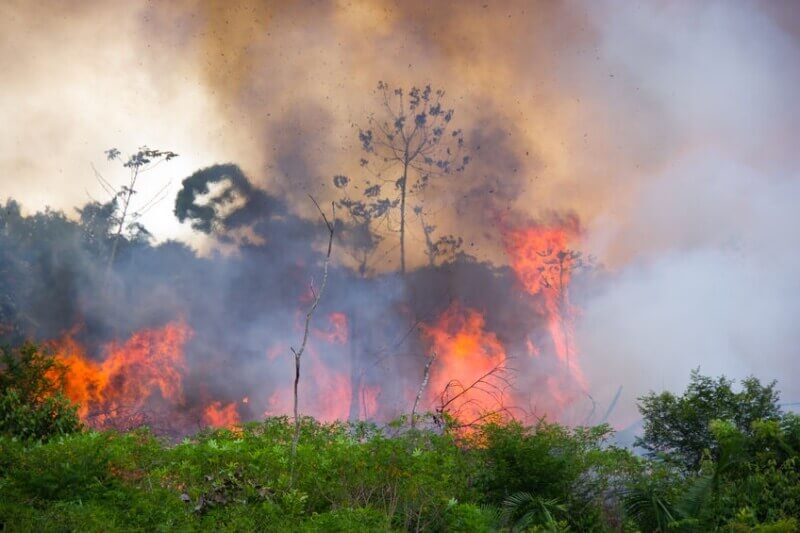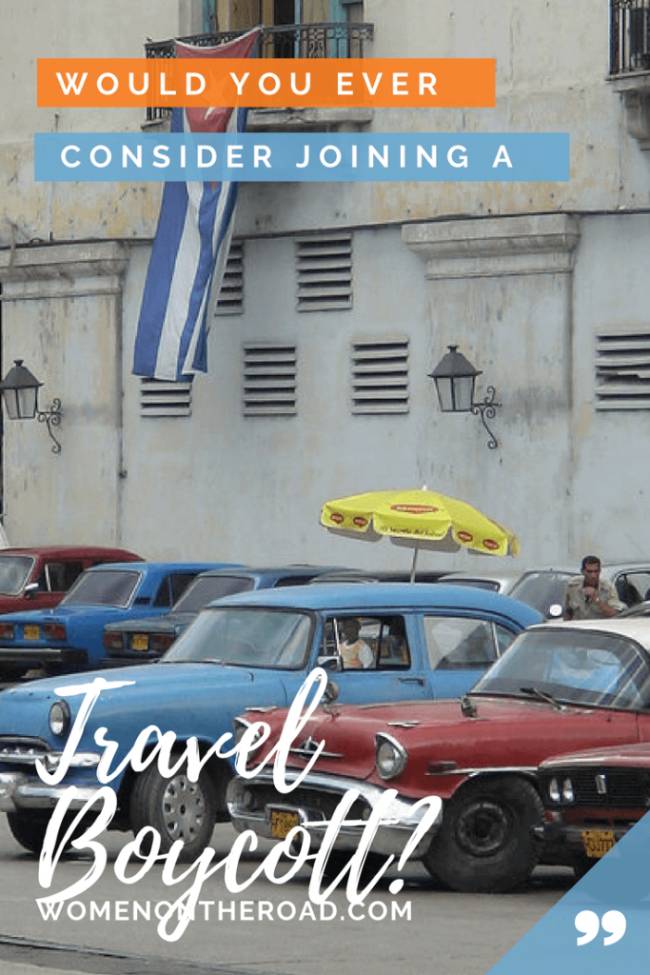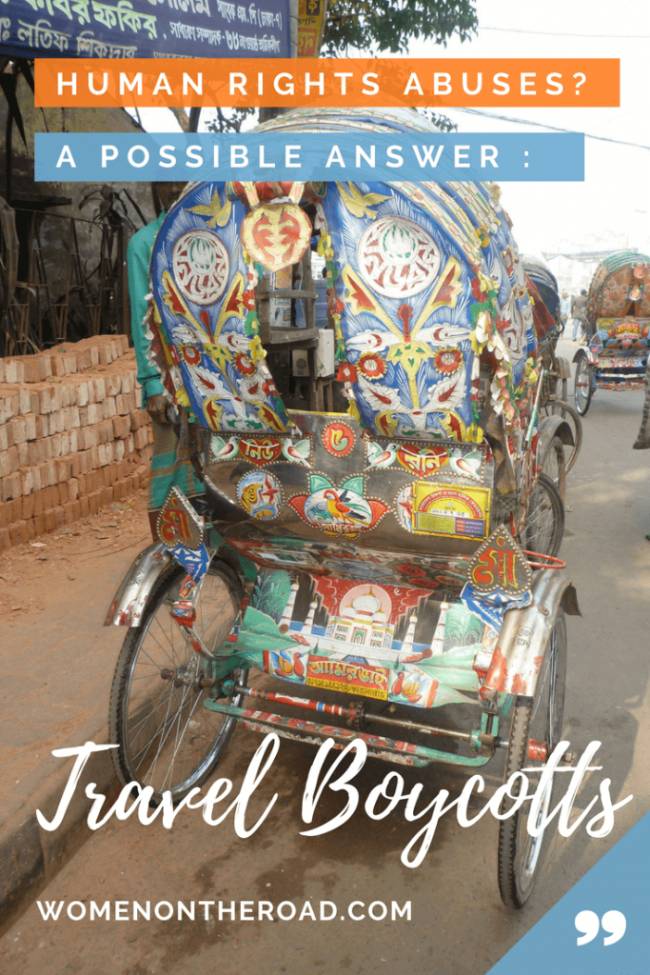Sometimes politicians make me angry.
By tearing apart migrant families, for example, or by criminalizing homosexuality or HIV, or by stripping citizenship from long-time residents because of religion or race.
It’s an upside-down world when a Nobel peace prize laureate, a hardened human rights campaigner, refuses to acknowledge ethnic cleansing on her doorstep. (Yes, Aung San Suu Kyi, I’m looking at you.)
Often, rulers defy the most basic human rights. These abuses affect me – but worse, they make me feel helpless.
So I react.
I complain on Twitter and Facebook. I promote causes dear to my heart in my weekly newsletter. And I threaten to boycott this or that country until they do the right thing… an “until” that rarely comes.
It’s complicated.
On the one hand, we want to take action against countries that bully their people. We want to do something right and fight the bad guys, and a boycott seems an easy or effective way to trumpet our opposition and make us feel as though we are actually doing something.

Ethical choices in travel
These days the question comes up almost daily. In a recent exchange with fellow travel bloggers I mentioned wanting to see St Petersburg. Someone pointed out – quite rightly – that gay tourists could be arrested for ‘propaganda’ and that we should all – gay or not – think twice about visiting a country with such discriminatory policies. (Russia is one example: there are 71 others).
Many nations have policies that are unacceptable by any human rights standards. Some regions treat women as second-class citizens at best, punishing them if they are raped; child marriage, often as young as eight, is a harsh reality for girls in certain countries; elsewhere, women who commit adultery might be stoned to death.
In some parts of the world, contemptible corruption keeps millions of people poor and hungry by diverting aid money to Land Cruisers, palatial homes and utterly unnecessary weaponry. Oppressive governments deny minority ethnic or religious groups their rights, steal their land and bomb their citizens.

Some Western countries – yes, OUR countries – have refugee policies so restrictive that asylum-seekers are routinely sent home to face probable death at the hands of hit squads or political opponents or twisted laws or even traditional practices like female genital mutilation.
Even within countries that consider themselves paragons of democracy, there are murky waters. Think restrictive immigration laws, seal cull, death penalty. We know these countries – they are ours.
What about countries that support the destruction of their rainforest, the pollution of their rivers, the slaughter of their wildlife and the assassination of their indigenous tribes for profit and access to natural resources?
And what of those that make life easy for sex tourists or the exploitation of children? You may well have visited at least one of those.
If I had the time I could probably list grievous human rights violations perpetrated by every country on earth. If we were to stick to our moral high ground,
Since that’s not practical, where do we draw the line and how do we register our discontent and repulsion?

Sometimes, issues collide.
As I said, it’s complicated.
What if a country with abhorrent policies uses its tourism income to help save a species from extinction or change the status of women by providing land and income? Just because a regime is intolerable in some respects doesn’t mean every single one of its actions is unconscionable.
TO GO OR NOT TO GO, THAT IS THE QUESTION
For many of us, ethical travel is a touchstone that informs our decisions and influences our choices. We study, we research, we care.
As travelers, we hold plenty of power.
Our actions support jobs in airlines, hotels, restaurants, travel agencies and the thousands of people whose livelihood depends on this industry.
We also support governments – both enlightened and repressive – through visa fees, government-owned accommodations and tour agencies, and currency exchange and banking. If we withhold that power, will we improve things or make them worse?
So we do have clout, especially in countries with major tourism industries. Some people are choosing to exercise it, with mixed results.

During apartheid, I – like millions – boycotted South Africa despite a keen desire to visit. Archbishop Desmond Tutu concluded the boycott had helped shift his country, and many of us would like to agree. Still, South Africa is an exception, one of the few successful destination boycotts and one backed by major global campaigns.
Under the Trump administration, Josh Neufeld, a Canadian scientist, declared he wouldn’t go to the US while Trump was president. Yet this Boycott USA Facebook page wasn’t updated much and automobile traffic from Canada clogged the US border on weekends. Even the long-standing US embargo on Cuba, which has had plenty of side effects, ultimately failed to topple Fidel Castro.
I visited Burma (Myanmar) several times at its most brutal. Some of those visits took place when I was a foreign correspondent reporting about the regime, but one or two were simply tourism – I wanted to revisit the temples of Bagan or paddle around Inle Lake. If I had listened to then house-arrested opposition leader Aung San Suu Kyi, I would have stayed away. Listening to dozens of simple people I met at food stalls or in the market, I was glad I came. (Given the present mass persecution and killings of the Rohingya people, I’m staying away, at least for now.)
The pros and cons of travel boycotts
So while the ultimate success of a destination boycott is unpredictable (unlikely, actually), boycotts can make a difference.
- Launching or joining a boycott makes a statement that we oppose what is going on. It gives us a voice, a platform, especially if we are trying to do the right thing.
- If a boycott works (and remember, the chances of this happening are extremely low), we could actually effect change. We may be helping improve or save lives, exerting pressure on despicable governments or forcing policy change.
- Joining this kind of action is a learning experience. Unless you’re the kind of person who unthinkingly signs everything, you’ll take a moment to find out about the issue. This education is priceless.
- A boycott will garner media attention, for what it’s worth. Shining a spotlight on abuse brings it to people’s attention.
But boycotts can also generate plenty of collateral damage. Boycotts can do harm, often to the very people we are trying to defend.
- Boycotts can eliminate jobs when tourists stay away, lowering hotel occupancy rates and emptying restaurants. Without customers, owners will soon be sending staff home.
- They can shut down the voices of reason, endangering local people and making them fearful to speak. Without visiting foreigners, dissenting locals have no one to reach out to.
- Boycotts often don’t work, and are nearly impossible to enforce.
- A poorly organized or ineffective boycott can strengthen a government’s hand and make an internal situation worse.
- Local activists may not want them: they have their own way of dealing with their government’s excesses. They’d rather lead the charge themselves and resolve problems within their own borders.
- Boycotts designed to bring attention to abuses may no longer be necessary – today’s social media will make sure the word gets around and issues brought out into the open, reported on by journalists and bloggers or singled out by organisations like Avaaz, Greenpeace, Human Rights Watch, Amnesty International or the United Nations.
- Tourism helps people and staying away only does individuals harm. Visitors who encounter abuses may come home more knowledgeable and willing to shine a light on what they’ve seen.
- A boycott may prevent you from engaging in valuable interaction with locals and exposing them to the type of thinking that may not be available to them if they live in a highly repressive society. By visiting, we can break down barriers and undermine some of the propaganda people are living with.
- Visiting a country allows people to be heard, to share their opinions and visions with outsiders, a valuable action where dissent is quashed.
Yes, boycotts may do damage but remember that by visiting countries ruled by loathsome regimes, we are helping fund them and, in a twisted way, giving them our stamp of approval.
What can we do instead of boycotting a destination?
So if boycotts rarely work and can do more harm than good, how do you voice your antagonism towards certain regimes when you travel to their countries?
- We can minimize support to nasty governments: we can live locally, stay in small family-owned homes, avoid government tours and offices, and try to steer our spending towards small private businesses. Make sure your money ends up in the right hands.
- We can practise selective boycotting: rather than an entire destination, stay away from those doing the harm. A hotel chain is dumping untreated waste into the ocean? Don’t stay there. A restaurant is mistreating its workers? Don’t eat there. A tour company is harming the environment? Don’t use them. Unlike massive destination boycotts, these more selective actions have a better chance of leading to change, especially if they are aimed at businesses.
- We can research a place before we go – not just the sites and restaurants but the government, the human rights record, the inequalities, and visit with our eyes open. (I’ve provided some research resources below.) This is our responsibility as conscientious travelers.
- We can raise our voices when we return, engage with citizens of that country, campaign, write to our own Representatives or MPs, make ourselves heard. We can post on Facebook and Instagram and write articles and blog posts that don’t only highlight what the government wants us to see. (And this is why my travel writing often goes beyond tourism.)
- We can talk to our family and friends, not only about the fine sand and delicious foods but also about repression and corruption and poverty and the many other issues much travel writing ignores.
Those of us who can afford to travel are often in a privileged position and can take action that will influence others. It is up to us to use that influence responsibly.
Boycotts are hugely complex and we owe it to ourselves and to the destination to make decisions with open eyes. Remember, a country is more than its government: it is the people and for every selfish bombastic idiot or murderous leader there are thousands of caring, responsible citizens who are fighting from within to change things where they can. Many Spaniards militate against bullfights, most Canadians don’t cull seals, and the majority of Americans aren’t set to self-destruct.
We’re all different, but my best hope of doing what I think is right is to be sensitive, informed and vocal, raising issues where I can or taking part in actions that convey how I feel about things.
Ultimately, it’s a personal, subjective decision.
— Originally published on 28 February 2018
Human rights and other ethical resources
- Human Rights Watch
- Ethical Traveler
- Amnesty International
- Avaaz
- Responsible Travel
- An example of public pressure that worked
PIN THESE PICTURES AND SAVE FOR LATER!



